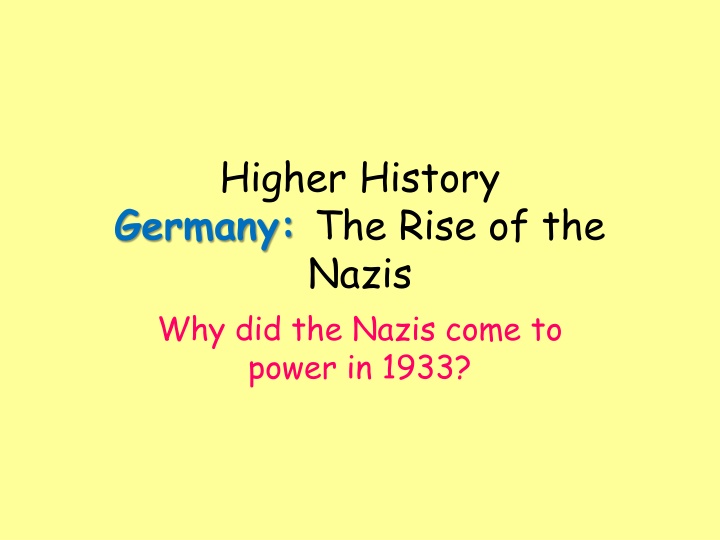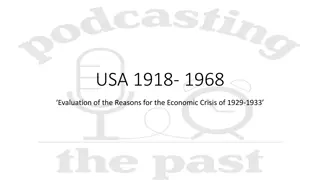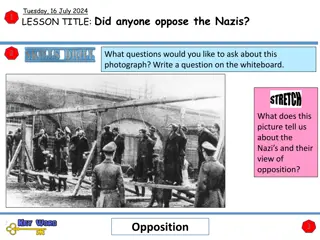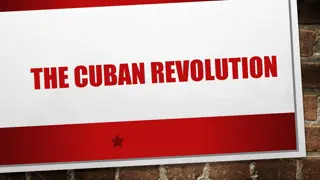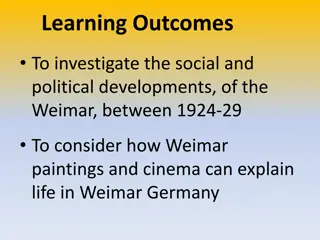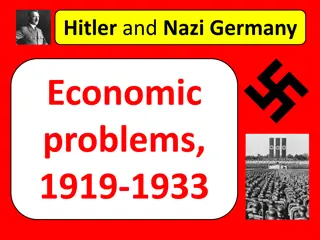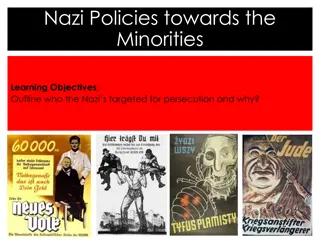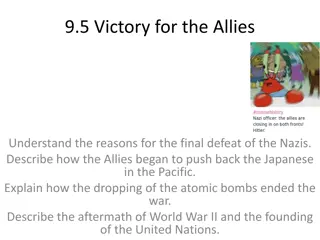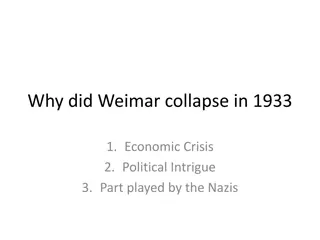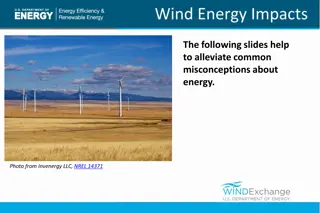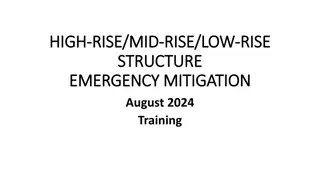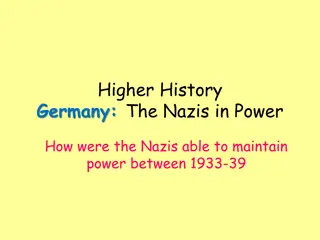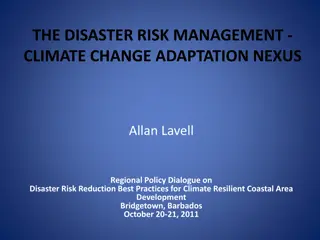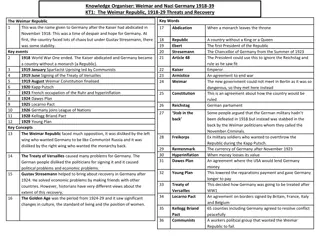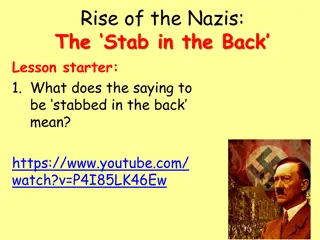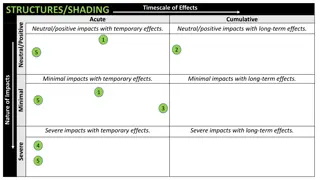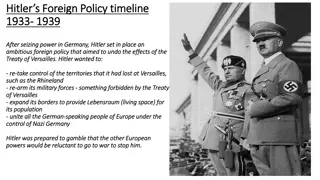Rise of the Nazis in 1933: Factors and Impacts
Explore the reasons behind the Nazis' ascent to power in 1933, covering political weaknesses of the Weimar government, economic challenges, the appeal of the Nazis, and the lack of unified opposition. Unpack the historical context of post-World War I Germany and the factors that contributed to Hitler's rise to chancellorship. Consider the significance of the Stab in the Back myth and its impact on German politics during this crucial period.
Download Presentation

Please find below an Image/Link to download the presentation.
The content on the website is provided AS IS for your information and personal use only. It may not be sold, licensed, or shared on other websites without obtaining consent from the author.If you encounter any issues during the download, it is possible that the publisher has removed the file from their server.
You are allowed to download the files provided on this website for personal or commercial use, subject to the condition that they are used lawfully. All files are the property of their respective owners.
The content on the website is provided AS IS for your information and personal use only. It may not be sold, licensed, or shared on other websites without obtaining consent from the author.
E N D
Presentation Transcript
Higher History Germany: The Rise of the Nazis Why did the Nazis come to power in 1933?
We are learning to Explain why the Nazis came to power in Germany in 1933 I can Build up notes on the topic Plan a 20 mark essay Pass a 20 mark timed essay
Introduction In January 1933 Austrian born Adolf Hitler became the chancellor of Germany However, until 1923 he was insignificant and unknown in German Historians debate the reasons why the Nazis were the biggest party in Germany by 1933 It is your job to explain all of the reasons; but also to judge which are more important than others
Background (need for intro) In November 1918, Germany lost the First World War, the Kaiser abdicated and the days of the German Empire were over A new democratic government was elected and it became known as the Weimar Republic as it met at the town of Weimar It was a socialist led coalition government and the first chancellor was Friedrich Ebert Although it was probably the fairest and most modern democracy in the world at the time, the Weimar government was unpopular and experienced many crises between 1918 and 33 During this time, the right- wing anti-democracy Nazi party led by Adolf Hitler gradually gained support in Germany
The arguments for the Nazis coming to power The Factors 1. Political weaknesses of the Weimar government 2. Economic problems 3. Appeal of the Nazis 4. Lack of any united opposition You should aim to cover 4 of these in your essay; but you must know all of them in case it is the isolated factor.
Weaknesses of Weimar: Knowledge The Stab in the Back myth Even from the moment of it s birth, the Weimar government was unpopular On 11thNovember 1918, the German generals and Weimar politicians signed an armistice which effectively meant Germany surrendered and lost the war A myth developed, particularly in right wing and conservative circles, that this surrender was unnecessary as Germany had not yet been invaded and could have fought on to won the war The myth supported the view that Germany had been forced to surrender by traitors within Germany Jews, Socialists and Communists
Stab in the Back: Analysis Analysis (basic) There is little doubt that the stigma of being the November Criminals (the politicians who signed the armistice) hung like a giant shadow over the Weimar government and it would be difficult to gain the respect and trust of the German people Analysis (+) However, the myth was exactly that a myth and in actual fact the German army was close to collapse in November 1918 and had Germany not converted to a democratic government their punishment would have been even more harsh, and most reasonable Germans knew this
Weaknesses of Weimar: Knowledge The Treaty of Versailles On 28thJune 1919, Germany was forced to sign what is probably considered one of the harshest peace treaties in history the Treaty of Versailles which the German government were allowed no say in it was nicknamed The Diktat Germany lost 13% of it s land to France, Poland and others Germany had to reduce it s army to 100,000 and could have no tanks or air force Germany had to pay 6.6 billion in reparations Germany had to take full responsibility for the war 3 million German-speaking settlers now lived in Czechoslovakia Germany lost all her colonies
Treaty of Versailles: Analysis Analysis (basic) The treaty was a horrendous blow to Germany as they lost money, their land and their pride and every German held the Weimar government in contempt for signing it and some historians have described the treaty as a dark shadow or a curse on the Republic Destroying the treaty became a central part of the Nazi party s policy and propaganda and Hitler exploited the treaty to gain support and votes from German people
Treaty of Versailles: Analysis Analysis (+) However, some Historians have pointed out that the Weimar government survived for more than a decade after the signing of the treaty and that the treaty was more of a blow to the government rather than the end of it and that the alternative of the war restarting if it was not signed was not what German people wanted
Weaknesses of Weimar: Knowledge Revolutions The Weimar government experienced a number of threats to its government 1918-1933 In January 1919, a group of Communists known as the Spartacists tried to start a revolution and overthrow the government to establish a Communist Republic. The government had to use ex-soldiers The Freikorps to put down the revolt. 700 were killed in the violence. In March 1920, the Kapp Putsch was when a right wing Journalist Wolfgang Kapp with a number of the Freikorps wanted to establish a new right wing anti- Versailles government. Kapp managed to seize Berlin and proclaimed a new government with him as chancellor while the Weimar government fled.
Revolutions: Analysis Analysis (basic) Both of these attempted revolutions show that there was widespread opposition to the Weimar government from both the left and right wing which backs up the argument that Weimar were very unpopular in Germany The revolutions also show that the Weimar government was unstable they relied on help from unofficial ex soldiers The Freikorps to maintain control which suggests they were not strong enough to put down a challenge to their government
Revolutions: Analysis Analysis (+) However, it is important to remember that both of these revolts ultimately failed. Ebert successfully put down the Spartacist revolt using the Freikorps, the leaders were killed and order returned to Germany and the revolt actually made people fear the Communists In addition, Ebert was able to organise a general strike in Berlin and put the Kapp Putsch down which showed that Ebert did have the support of those in Germany s capital
Weaknesses of Weimar: Knowledge Democracy The Weimar constitution has been called a perfect democracy on paper meaning it had some flaws in reality All Germans over 20 had the right to vote in elections using proportional representation, meaning 15% of the votes earned a part 15% of the seats. This led to the growth of many small, extremist parties. In some elections there were almost 35 parties to choose from. The PR system made it almost impossible for one party to gain a majority vote. Two or more parties tried to form coalition governments which were weak and often argued, causing the government to collapse. There were 9 elections between 1918-28.
Democracy: Analysis Analysis (basic) The system of elections in Weimar Germany was confusing to many German people who didn t understand what all the parties stood for or how a government was elected, causing democracy to become unpopular Coalition after coalition led to the belief in Germany that democracy was weak and unstable and the Nazis exploited this to promise voters a return to a strong government
Democracy: Analysis Analysis (+) However, it is important to remember that many liberal Germans supported a proportional democracy and did not want to return to the autocratic Kaiser years of pre 1918 In addition, although PR was supposed to help smaller parties like the Nazis it also helped extremists parties on the left like the Communists into the Reichstag who were the Nazis biggest opposition so it didn t only help the Nazis
Economic Problems: Knowledge Hyperinflation 1923 Paying 100 million per year for 66 years under the Treaty of Versailles crippled the German economy and they defaulted on their repayments in 1922, causing Belgian and French troops to occupy the industrial Ruhr Workers in the Ruhr went on strike and the Weimar government continued to pay them by printing more paper money which caused the Germany mark and the economy to collapse as money became worthless. In January 1922, $1 was worth 80 marks but by November 1923 $1 was worth 4.4 million marks. A Kolbi cabbage cost 50million marks. Life savings became worthless, middle class people lost everything, people on set salaries and pensions now earned nothing, bartering replaced cash exchanges.
Hyperinflation: Analysis Analysis (basic) The Weimar government were held responsible for the collapse of the German economy due to their acceptance of Versailles and poor management of the Ruhr crisis Many Germans, particularly the middle class, never forgave the Weimar government for the humiliation that was forced on them due to hyperinflation and it was these people that turned to the Nazis Hyperinflation also had political consequences as Adolf Hitler tried to seize power in Bavaria in an attempted revolution where he capitalised on the misery of 1923
Hyperinflation: Analysis Analysis (+) However, it is important to remember that the Weimar government quickly recovered from hyperinflation and took swift action to end the crisis Gustav Stresseman was appointed chancellor, money was borrowed from America under the Dawes plan and a new currency was introduced By 1924, Weimar was experiencing a Golden Age of prosperity and wealth and support for democracy grew with the economy showing that the effects of hyperinflation were not long lasting
Economic Problems: Knowledge The Great Depression 1929-33 With the collapse of the New York Stock Exchange (The Wall Street Crash) in October 1929, the USA immediately demanded the repayment of their loans to Germany, causing the German economy which was reliant on US loans to collapse Unemployment rose, businesses collapsed, banks closed. The socialist-led coalition resigned as they couldn t deal with the problems and the President had to operate under Article 48 The Emergency Decree, giving him extra power. Unemployment rose to 3 million in 1930 and by 1932, 6 million Germans were unemployed. 30% of the German population had no employment or income. Homelessness and hunger rose.
The Great Depression: Analysis Analysis (basic) The Weimar government had now led Germany into financial ruin twice and Germans blamed the crash on their over-reliance on US loans and inability to manage the crisis. Support for democracy collapsed. Nazi propaganda went in to overdrive during the Depression and they promised jobs to every unemployed German, gaining them support and votes across Germany. The Nazi vote went up to 13.7million in July 1932. Many historians have put forward the view that the Depression was the wind in the Nazi s sails
Great Depression: Analysis Analysis (+) However, more recent research has suggested that not all unemployed people voted for the Nazis that Catholics remained loyal to the Centre party and many unemployed working men continued to support the socialists Most of the Nazis votes came from farming communities and small towns, destroying the belief that unemployed men in the cities all voted for the Nazis It is also important to remember that the Communist vote rose during times of misery too, and they were also able to exploit the Depression to their advantage; not just the Nazis.
Appeal of the Nazis: Knowledge The Nazi Party Policies Changing to the Nazi party from the German Worker s party in 1920, the Nazi party was violently nationalistic The Nazi Party had policies with a broad appeal which were popular across every sector of society They promised jobs for the unemployed To the conservatives they promised to rip up the Treaty of Versailles and rebuild the German army They offered farmers higher prices for their goods They offered businessmen the destruction of Communism & Jewish banks The young were offered hope and jobs for the future
Policies: Analysis Analysis (basic) The Nazis gained support and votes from every sector of German society rich and poor, young and old, with their broadly appealing policies whereas other parties focussed on one demographic, for example the Communists only received support from poorer Germans Analysis (+) However, the Nazi party policies were clearly contradictory i.e. better wages for workers but also restricting the power of trade unions and many Germans were able to see through the Nazi s unrealistic promises. In addition, the Nazis needed economic crises for people to listen to their promises they had the same policies during the Golden Age of 1924-29 yet were gaining only around 800,000 votes in 1928
Appeal of the Nazis: Knowledge The Nazi Party Organisation Propaganda was key to the Nazis success, Joseph Goebbels was vital in helping to spread the Nazi message through posters, speeches, leaflets, rallies and new media like radios and cinema which always presented the Nazis as the saviours of Germany Hitler s alliance with Alfred Hugenberg who had a monopoly over German newspapers and cinema allowed the Nazis to reach a mass audience as during the 30s most people went to the cinema twice a week Their election campaigns were run with military efficiency and Hitler had perfected his campaigns during the 1920s; Hitler had outstanding public speaking abilities, the swastika was plastered everywhere, Nazi party members were controlled strictly, the uniformed SA protected rallies and meetings & started violence on the streets to create a sense of political instability
Party Organisation: Analysis Analysis (basic) Many historians argue that Goebbels in particular and Nazi propaganda was important in causing people to believe that voting for the Nazis would genuinely lead to an improvement in their lives Historians also believe that Hitler was the biggest asset to the Nazi party in elections and that they were the only party in the 1930s who had realised the persuasive power of cinema Analysis (+) However, it is important to remember that in the last free election in November 1932 the Nazis won 196 seats in the Reichstag which was only 33% of the vote, a huge disappointment to Hitler, which shows that the Nazis were still not appealing enough to voters to win a majority in the Reichstag.
Lack of United Opposition: Knowledge Lack of Opposition The other parties in the Reichstag cannot escape responsibility for the success of Hitler The Socialists (SPD) and Communists (KPD) could have joined together to defeat the Nazis as they were both left wing parties, However the Spartacist Uprising in 1919 proved to be an issue as the Socialist wouldn t forgive the Communists for starting an uprising and the Communists wouldn t forgive the Socialists for their executing the Spartacists The Centre parties such as Zentrum and the Democratic party should have opposed Hitler due to their belief in democracy but they had lost so many votes during the Depression they felt too weak to do so The Right wing helped Hitler into power. Right wing politicians Von Papen and Von Schleicher convinced Hindenburg to appoint Hitler as chancellor in January 1933 as they were more concerned with setting up a strong anti-Communist government than preserving democracy
Lack of United Opposition: Analysis Analysis (basic) Due to old mistrust on the left and self-interest on the right, no German parties were willing to work together to stand against the Nazis, making the Nazi Rise to power in the 1930s virtually unchallenged The actions of right wing politicians helped Hitler into power as due to their opposition to Communism and democracy, they convinced President Hindenburg against his own wishes to put Hitler in the position of German chancellor, the leader of the Reichstag in 1933 in the hope he would protect their own interests
Lack of United Opposition: Analysis Analysis (+) However, it is important to remember that Hindenburg s decision to appoint Hitler as chancellor was a difficult one as there were few real candidates for the job and the Nazis were causing parliamentary chaos by walking out of the Reichstag so that votes could not be passed In addition, Hindenburg appointed Hitler chancellor to keep an eye on him and it was not until the Reichstag Fire in February 1933 that Hitler passed the Enabling Act which gave him the real authority to pass laws in Germany
Consolidation A good idea when you have taken all your notes for a topic is to create a condensed revision guide for the essay This might be a mind map, picture map, bullet points etc. but should fit on one page Do this for homework (example on next page)
Success Criteria All four factors covered 2 Knowledge points for each factor (min) 4 examples of basic analysis 2 examples of A+
Essay Questions Rise of the Nazis is an example of an isolated factor essay this means the SQA will ask you whether the Nazis came to power because of a specific factor (one of the 4 we cover) You must talk about the factor in the question BUT you do not need to agree it is the most important Examples To what extent was the rise of the Nazi party due to the appeal of the NSDAP? How far can it be argued that The Nazis came to power in 1933 due to resentment over the Treaty of Versailles ? The rise of the Nazi party in German was largely due to propaganda . Discuss.
Introduction 3 step plan Background (give 2-3 sentences of what Germany was like around the end of WWI) After WWI Factors (what are the factors in the essay?) There were many important factors in the rise of the Nazis such as (a list is fine) Argument (what will you be arguing is most important?) It can be argued that the most important factor was because
Conclusion 4 step plan In conclusion, there were many reasons why the Nazis came to power in 1933. On the one hand (you should take one key factor here and explain why it was important) On the other hand (now you should do the same with another key factor to balance your argument) Overall, the most important factor was (keep your strongest until last, backing up why it is so important and it should be clear why it outweighs the other factors)
Evaluation A good way to approach trying to get the final 4 marks for evaluation is to take your factors (5 in this case) and rank them from most important to least important Try to come up with a reason Why each is in that place (not why it is important but why it is more or less important) A priority diagram can be a good technique to use try to relate every factor back to your most important
Factor 1 Factor 2 Factor 3 Factor 4
Evaluation E1 and E2 - 2 marks can be gained from making evaluative comments which relate to individual factors Example Upon evaluation, ______ was the most/least important factor in the Rise of the Nazis because... NB You must be saying something new in your evaluation, not repeating your analysis or doing mini conclusions
Evaluation + E+ - up to 4 marks can be gained from making evaluative comments which show the relative importance between factors (i.e. you compare two) Example Upon evaluation, the economic problems were more important than ______ because... NB You must be saying something new in your evaluation, not repeating your analysis or doing mini conclusions Remember analysis is really tricky and many candidates get 0/4 but still get an A!
